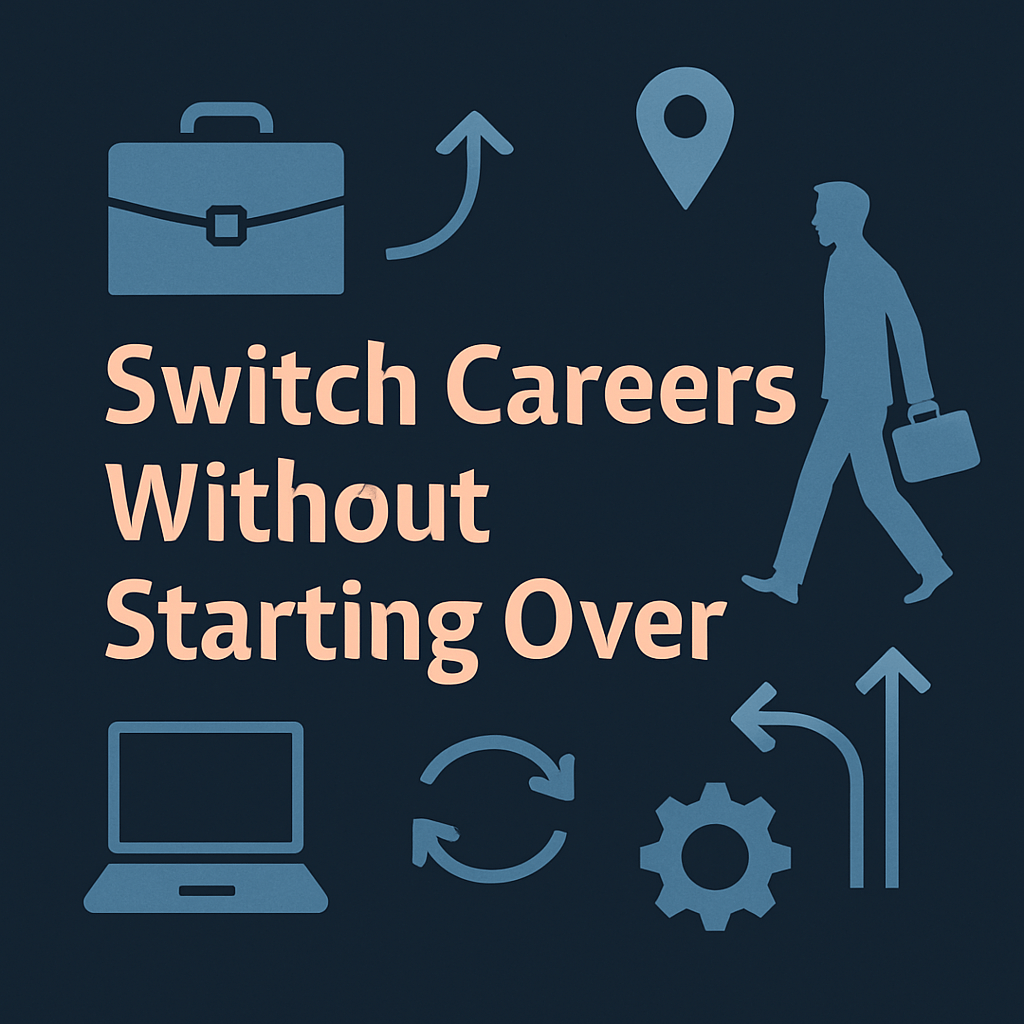When I was younger, I often got asked what I wanted to be when I grew up. It’s a common question: every parent, relative, and even stranger seems to love hearing kids dream out loud. And while some grow up to do exactly what they said, many of us end up improvising. Life is, after all, a series of revisions. For many working adults, that improvising never really stops.
At some point, we begin to question if the job we have is truly the one we want to keep doing, not that we hate it, but as I said, life happens. Sometimes, it’s a midlife career change brought on by burnout, terrible working experiences, a shift in priorities, or a longing for more meaningful work that leads many people to a stage where job satisfaction starts to fade. Besides, thanks to the rise in upskilling and reskilling options today, making a career transition feels more achievable and manageable. But then there’s the drawback of starting over from scratch. For many, changing occupations comes with the idea of starting from ground zero; new experience building, new networking, new life strategies altogether, which doesn’t exactly sound appealing to most.
Well, today I am here to tell you that changing your career doesn’t have to mean going back to zero. With the right mindset and strategy, you can switch careers without starting over, sometimes even coming out ahead.
Why People Change Careers
There are countless reasons people decide it’s time for a career shift, and none of them are wrong. Here are some of the most common reasons people switch careers:
-
Burnout and job dissatisfaction: Constant exhaustion, irritability, and lack of motivation? It isn’t just a bad week; it might be burnout. Many professionals realize they’re running on empty, and no amount of coffee or vacation time seems to help. If the thought of Monday gives you anxiety or you’ve lost any spark for your work, those could be signs you need a career change.
-
Lack of career growth: After years in a role, some workers find themselves stuck as promotions never come, projects no longer challenge them, and a sense that they’re stagnant in place. When ambition hits a wall, the natural next step is to look for new terrain to climb.
-
Better pay or benefits: It’s not greedy to want financial security; it’s smart. And with today’s economy, a bigger cash pool is definitely a plus. If you’ve been putting in the work and not seeing it reflected in your paycheck or lifestyle, it makes sense to explore other careers that can offer more stability or flexibility. Sometimes, a career transition is inspired simply by the need to live a better life.
-
Desire for purpose and fulfillment: Over time, many people want more than just a paycheck; they want impact. Whether it’s teaching, helping others, creating something meaningful, or working in a cause-driven field, this desire often pushes professionals to rethink their path. Aligning career goals with personal values can transform work into something deeply satisfying.
-
Life changes: Major life events have a way of reshuffling priorities. Becoming a parent, moving to a new city, dealing with illness, or experiencing global upheaval, like that previous COVID-19 pandemic, often forces us to reevaluate what truly matters. These moments can lead to unexpected and necessary career pivots.
Understanding your “why” is the first step toward making a smart, sustainable switch.
The Pitfalls of a Career Change
The pros of changing careers often sound and look promising, but let’s not get ahead of ourselves. Before we get into how to change careers without starting from scratch, let’s be real about what could go wrong:
-
Starting at the bottom again: One of the biggest fears is the loss of status. If you’ve built a reputation, climbed the ladder, or earned a leadership role, the thought of starting over as a junior employee can feel like a major step back. But here’s the truth: not all transitions require you to go back to square one. By identifying and highlighting your transferable skills, leadership qualities, and relevant achievements, you can position yourself for lateral moves or even step into new roles at a similar level.
-
Education costs and time: Many believe changing careers means heading back to school full-time or earning another expensive degree. While some fields may require formal education, many don’t. The rise of micro-credentials, online certifications, and bootcamps means you can fill knowledge gaps more affordably and flexibly. Still, these learning curves take time and mental energy, so it’s important to plan your transition in a way that’s sustainable.
How to Stay Disciplined while Taking Online Courses and Actually Finish Them
-
Impostor syndrome and ego: Breaking into a new field can shake your confidence, especially if you’re surrounded by younger professionals who seem more at home in the new space. You might feel like you don’t belong, or worry that others see you as inexperienced. It’s humbling to go from expert to novice, but remember, your broader life and work experience bring value that can’t be taught in a classroom. Combatting impostor syndrome means reminding yourself that learning is lifelong, and everyone starts somewhere.
-
Wrong assumptions: Passion is important, but it’s not enough. Sometimes people jump into a new career based on a fantasy, only to find it doesn’t align with their strengths, values, or day-to-day preferences. That dream job might involve more stress or less flexibility than imagined. That’s why research is a must: talk to people in the field, test it with a side project, or shadow someone first. Avoid romanticizing the unknown; instead, make sure it’s a good fit for your real life.
What to Consider Before Changing Careers
A successful mid-career transition begins with thoughtful decision-making. Before taking the leap, ask yourself:
-
Am I unhappy with my job, my team, or my industry? It’s important to find the root cause of your dissatisfaction. Are you burned out because of a toxic boss, an unfulfilling role, or a broken system in your industry? If it’s the team or workplace culture that’s the problem, you might not need a full-blown career switch; maybe a new employer within the same field will be enough… a toxic work environment has a way of eating away at us. So, making that distinction can save you unnecessary risk. You might find this article helpful in this regard. Why More People Are Quitting Their Jobs without a Back-up plan, and What That Says About Work Today.
-
What are my core values and non-negotiables? Career fulfillment often comes from alignment with your personal values; as such, always ask yourself what truly matters to you: Is it work-life balance, creative freedom, job security, or mission-driven work? Clarifying these non-negotiables helps you filter out opportunities that may pay well but ultimately feel empty for you.
-
Do I have transferable skills that could serve me elsewhere? Chances are, you’ve built valuable experience that doesn’t vanish just because you’re changing industries. Skills like leadership, communication, organization, mentoring, and project management are in high demand across the board. Recognizing and naming these transferable skills will help you reframe your experience when talking to hiring managers in a new field.
Slowing Down From Work: Why and How Taking a Break Boosts Your Overall Performance.
-
Can I test this new path first? Before you fully commit, dip your toes in to test the water’s temperature. Try freelancing on the side, volunteering, job shadowing, or setting up informational interviews. These low-risk experiments can help you understand the daily realities of a new role and confirm if it’s really a fit, or save you from making a costly mistake.
How to Change Careers Without Starting Over
Now, let’s talk strategy. Here’s how to pivot your career smartly, preserving your experience and professional identity:
-
Identify your transferable skills
You might be surprised how much you already bring to the table. Soft skills like communication, leadership, problem-solving, and time management often translate seamlessly across industries. Hard skills such as budgeting, marketing, or tech proficiency can also be applied in new contexts. Spend time mapping out your strengths and thinking about how they might be relevant in a different field. Don’t underestimate the value of experience, even if it’s from a different industry.
-
Reskill or upskill wisely
You don’t always need a full degree to be career-ready. Targeted learning is more strategic. Identify the exact skills or knowledge gaps in your new field and fill them with short online courses, certifications, workshops, or bootcamps. Platforms like Coursera, LinkedIn Learning, and Google Career Certificates offer flexible, affordable options. Many employers are now more interested in demonstrable skills than formal credentials.
You can check out The Best Online Courses for Career Advancement in 2025 With Proven Results.
-
Redefine your narrative
Think of your career change not as starting over, but as evolving, a mere “next step” in your life. And what better way to advertise this than via a story? Build a professional story that shows how your past experience enhances your future potential. Did you lead teams? Solve complex problems? Build relationships? Great, these are timeless strengths. Emphasize how you bring a fresh perspective, maturity, and adaptability. This reframing positions you not as a “beginner,” but as a “seasoned newcomer.”
-
Network with intention
Your network is your most powerful tool in a career transition. Reach out to people in your target industry for informational interviews, as these conversations can offer invaluable insider insights. Attend meetups, webinars, or conferences where professionals in your desired field gather as a way to build genuine connections. Many job opportunities come from referrals, not job boards. Don’t be afraid to say, “I’m exploring a transition, can you share your experience?”
-
Start small before going all-in
Big steps can feel risky. Instead, consider dipping your toes into the new field through side gigs, part-time roles, freelance projects, or volunteering. These mini-experiments allow you to gain practical experience, build a portfolio, and make industry connections all without sacrificing financial stability. Think of it as building a bridge instead of making a blind jump.
-
Tailor your resume for a career change
Your resume should focus less on job titles and more on accomplishments and skills, and the best way to do this is to reframe your experience to highlight relevance: how did your previous roles help you develop competencies that are useful in your target career? Use a functional or hybrid resume format that emphasizes skills over chronology. Also, include a summary at the top that clearly states your career change intention and the value you bring.
Changing careers doesn’t mean throwing your old life away; think of it more as a means to building something new using what you already have. A mid-career transition can feel scary, but then again, professional reinvention is basically changing what you have achieved all your past years.
So if you’re wondering how to know if it’s time for a career change, or how to switch careers without starting over, just know this: you’re not alone. Your experience matters. And your next chapter could be your best one yet.






[…] up or exploring a new field casually, short courses with 1–2 hour runtimes may suffice. But for career changes, accredited certification, or portfolio-building, you’ll want longer courses that provide […]